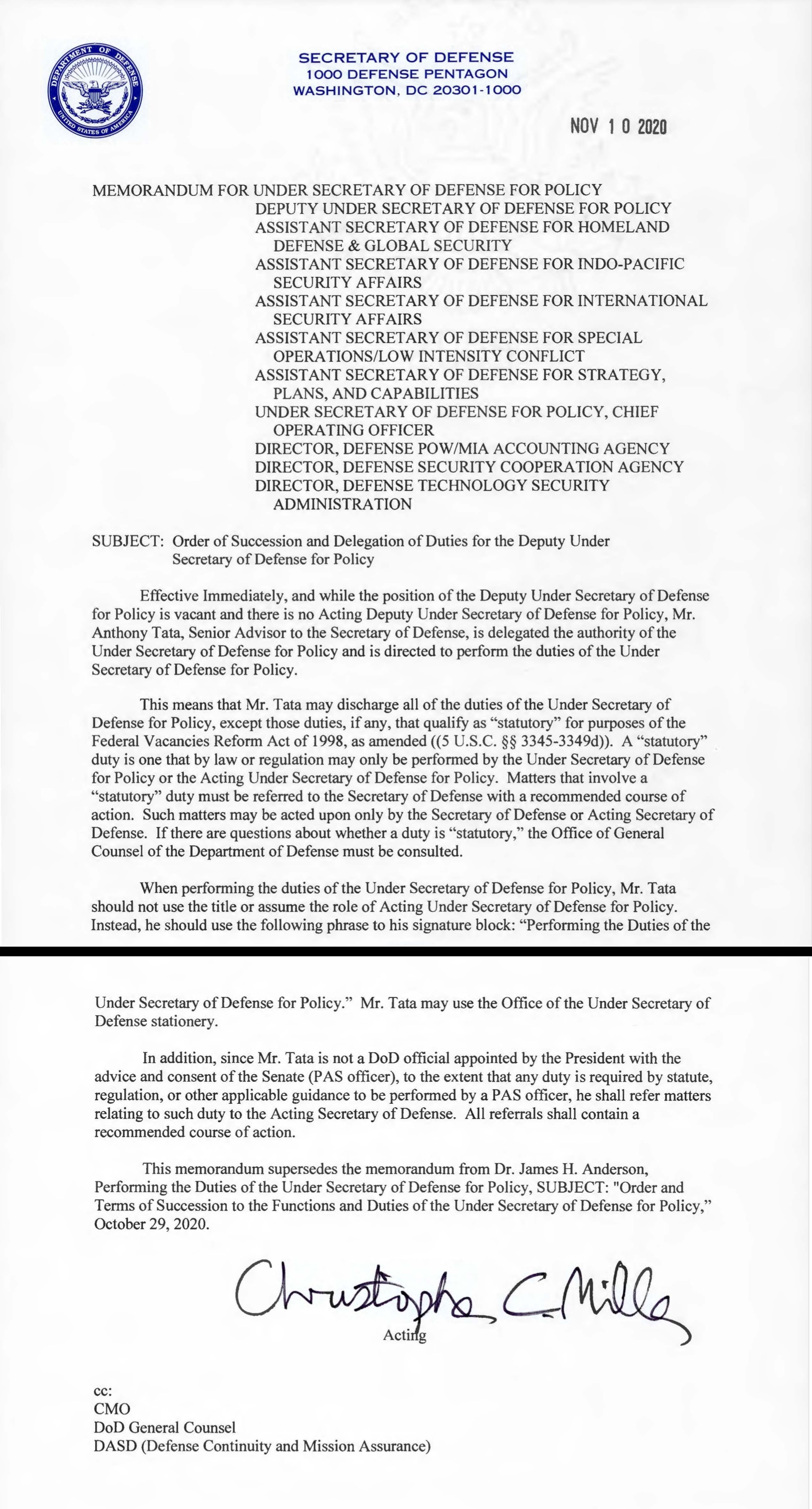
Tony Tata, then the director of North Carolina's Dept. of Transportation, speaks in 2013. NCDOT
Trump Installs Senate-Rejected Retired General As Pentagon Policy Chief
Anthony Tata moves up one grade level — with some limits attached.
Updated: 2:30 p.m. ET
President Trump’s deeply controversial nominee to become the top policy official at the Pentagon, rejected by the Senate over the summer, will assume the duties of the post following the resignation of former acting policy chief James Anderson earlier on Tuesday.
“Effective immediately, and while the position of the Deputy Under Secretary of Defense for Policy is vacant and there is no Acting Deputy Under Secretary of Defense for Policy, Mr. Anthony Tata, Senior Advisor to the Secretary of Defense, is delegated the authority of the Under Secretary of Defense for Policy and is directed to perform the duties of the Undersecretary of Defense for Policy,” Acting Defense Secretary Christopher Miller wrote in a Nov. 10 memo obtained by Defense One.
Tata had been serving as “the official Performing the Duties of the Deputy Undersecretary of Defense for Policy” — effectively Acting Undersecretary Anderson’s number-two. Because Tata has not been officially named as an “acting” official, he will be legally limited in what he can do in the role. (It’s not clear that Tata’s previous service qualifies him to become acting defense undersecretary under the 1998 Federal Vacancies Reform Act, although some legal scholars said so.) But the maneuver nevertheless allows Trump to slide a key loyalist into a deeply influential Pentagon office.
According to the memo, Tata may not discharge any so-called “statutory” duties — those that “by law or regulation” may only be performed by a Senate-confirmed undersecretary of defense for policy or an acting undersecretary. Instead, Tata must refer those duties to the defense secretary — the recently appointed Miller, himself in an acting capacity — with a recommended course of action.
The memo also says that Tata cannot use the title of acting defense undersecretary for policy. He is allowed to use policy office stationery, but his signature block must state his title as: “Performing the Duties of the Under Secretary of Defense for Policy.”
Tata, a retired Army brigadier general who became a novelist and a Fox News commentator, will have only limited time in the role. Although Trump has refused to concede the election, claiming without evidence widespread voter fraud, President-elect Joe Biden is scheduled to be inaugurated on Jan. 20.
In June, Trump named Tata to the top policy post, but could not persuade the Senate Armed Services Committee to usher him to the floor for a vote. Tata drew fire for falsely saying that former President Barack Obama was a “terrorist leader” and a Muslim. He has pushed conspiracy theories on Twitter that former CIA Director John Brennan sought to overthrow Trump and even to have him assassinated.
“Anthony Tata has no business working in the Pentagon in any capacity,” Sen. Kamala Harris, D-Calif., now vice president-elect, tweeted in August. “His vile Islamophobic comments are disqualifying, period. Our service members deserve better from their leadership.”
Although Democrats were unified in their opposition to Tata’s nomination from the beginning, several GOP members of the panel also expressed discomfort with him during his confirmation process, and it was that discomfort that jolted his nomination off the tracks. His nomination hearing was abruptly canceled the morning it was scheduled to take place and the committee never took a vote.
Tata at that point was ineligible to become the acting policy chief, and instead was tapped as “the official Performing the Duties of the Deputy Undersecretary of Defense for Policy” — effectively Acting Undersecretary Anderson’s number-two.
Anderson resigned on Tuesday, reportedly after clashes with the White House. Politico first reported Anderson’s resignation.
“I am particularly grateful to have been entrusted with leading the dedicated men and women of Policy, who play a key role in our Nation’s security,” Anderson wrote in his resignation letter. “Now, as ever, our long-term success depends on adhering to the U.S. Constitution all public servants swear to support and defend.”
He was the second senior defense official to depart the Pentagon in as many days: Former Defense Secretary Mark Esper was dismissed on Monday by Trump, who issued a surprise tweet announcing that he had “terminated” a third SecDef. Esper clashed with Trump numerous times this year, notably following the police killing of George Floyd in May.Current and former officials expect that Trump may move to fire other senior national security officials with whom he has clashed in the waning weeks of his presidency.




